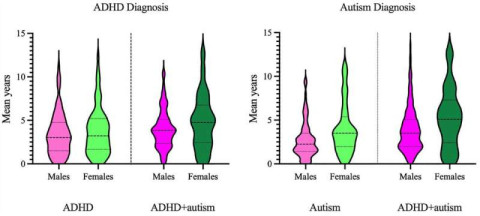
Diagnostic delay is a major concern for children and young people with autism and attention deficit hyperactivity disorder (ADHD)—and also for their loved ones.
The delay is the gap between first concerns about a child's development, and their eventual diagnosis. In some cases this can be more than five years.
Monash Ph.D. candidate Rachael Knott, from the School of Psychological Sciences and Turner Institute for Brain and Mental Health, has co-led a new study of nearly 700 Australian parents or caregivers that investigates the delay. The work is published in the Australian & New Zealand Journal of Psychiatry.
It's the first worldwide to directly compare age at diagnosis and diagnostic delay for males and females across ADHD, autism, and a combination of the two.
Knott explains the research to Lens.
First, what did you find out?
We confirmed what we were expecting and what we were hearing from families, which is that it takes a really long time to get a diagnosis of ADHD or autism. The lowest estimate was three years, and up to four-and-a-half years.
The recent report from the Senate inquiry into the "assessment and support for people with ADHD" also highlighted long wait times for people seeking a diagnosis.
Another component we looked at was differences between males and females within each group, which also hasn't really been looked at, especially in the co-occurring group.
Females with autism and females with both autism and ADHD were waiting longer than males to get their autism diagnosis, with females in the co-occurring autism and ADHD group having the longest delay. That was just over five years.
What needs to be done about this?
It tells us we need more education and training for people involved in every stage of the process. Caregivers need more information on what to look for in the early stages. Maybe we need more specialist training for GPs, pediatricians and psychologists so more people can identify the early markers of the conditions, and hopefully or diagnose refer sooner.
We need more clinicians who are specialized in the area and know what to look for, especially when autism and ADHD occur together and how that might present.
Hopefully that would speed up the process of identifying and diagnosing.
GPs would seem to be crucial in this?
Yes. GPs can be the initial gatekeeper, because parents come to them with a concern. They need to know more about what warrants referral.
At the moment we don't have guidelines on diagnosis for the co-occurring group. We do have diagnostic and treatment guidelines for autism only, and we've got the same for ADHD only, which have just come out in Australia, which is really exciting.
But what we don't have yet are guidelines specifically for this co-occurring group, and how they might be different. We don't have enough research yet to write those guidelines, but we're heading in that direction. Our paper is saying, "We need this, it's taking too long."
What's the process like now for a parent or caregiver?
In Australia, when children get a diagnosis, that's a gateway for support and funding. The faster we can identify and diagnose kids, the faster they have access to all of these things.
But the process is rarely linear and straightforward. There's a lag between when parents or teachers pick up some kind of neurodivergent development happening to when they go see their health care professional. And then, from that point, another lag on how long it takes the clinicians to disentangle what's going on with the child.
We've chosen to include this period of first concerns because parents and caregivers and teachers are important stakeholders in this discussion. That lag period can be about a year. If we don't include that, we're not really understanding the full picture.
More information: Rachael Knott et al, Age at diagnosis and diagnostic delay across attention-deficit hyperactivity and autism spectrums, Australian & New Zealand Journal of Psychiatry (2023). DOI: 10.1177/00048674231206997
from https://medicalxpress.com/news/2024-01-qa-barriers-earlier-autism-adhd.html